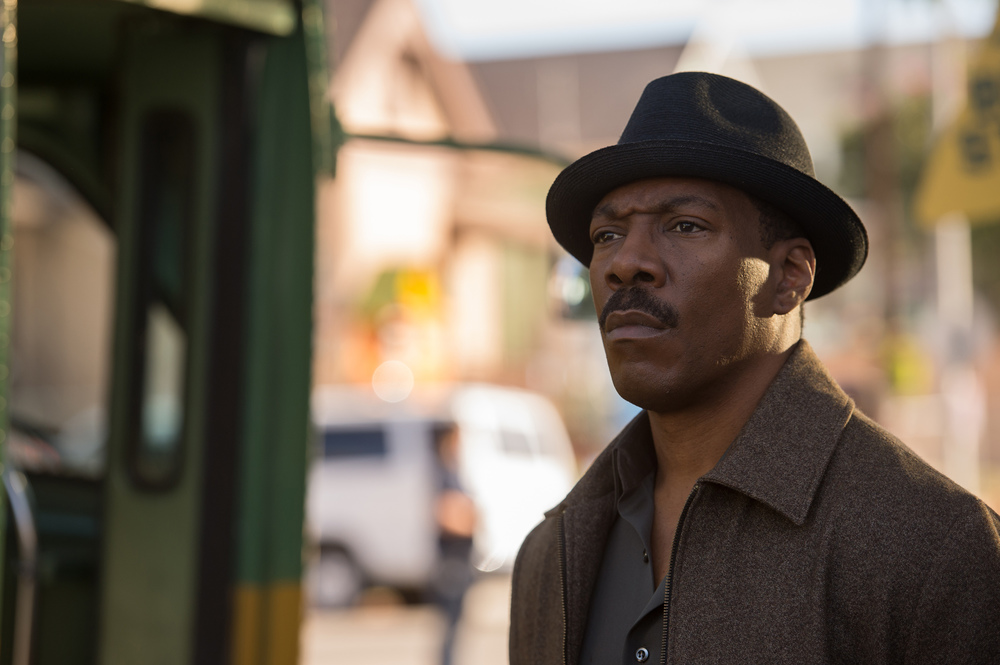 If you have been waiting almost three decades for a remake of “Driving Miss Daisy,” Bruce Beresford has the film for you (again). In the nostalgic weepie "Mr. Church," the director takes a number of elements from his aforementioned 1989 drama, with Eddie Murphy starring as a humble cook who helps out a single mother and daughter, developing a relationship that goes far beyond employee and employer. It’s unfortunate that with Murphy doing so little film work recently, this is one of the few projects he chose, as he delivers a largely warm and restrained performance that is definitely against type, and is far better than the material he’s given.
If you have been waiting almost three decades for a remake of “Driving Miss Daisy,” Bruce Beresford has the film for you (again). In the nostalgic weepie "Mr. Church," the director takes a number of elements from his aforementioned 1989 drama, with Eddie Murphy starring as a humble cook who helps out a single mother and daughter, developing a relationship that goes far beyond employee and employer. It’s unfortunate that with Murphy doing so little film work recently, this is one of the few projects he chose, as he delivers a largely warm and restrained performance that is definitely against type, and is far better than the material he’s given.
“Mr. Church” begins in Los Angeles in 1971 with the unexpected arrival of the titular character (Murphy) in the apartment Charlotte (Natalie Coughlin) shares with her single mother, Marie (Natascha McElhone). “There’s a black man in our kitchen, cooking eggs,” Charlotte complains. Her mother explains to her — and the audience — that he is a gift from a rich man she was having an affair with. We learn soon Marie has been diagnosed with breast cancer, and has six months to live, and that Mr. Church is only meant to stay with Charlotte and her mother until she passes away. Charlotte knows neither of these key facts, and she is frequently kept in the dark by both her mother and Mr. Church, a feeling that the audience will share. There’s plenty that we never learn about Mr. Church, and it seems less like intentionally keeping the man a cipher and more like lazy storytelling.
The narration from older Charlotte (Britt Robertson) frames the film, with her purple prose coloring it with broad strokes. Young Charlotte dislikes Mr. Church’s presence in their home, refusing to eat the food he makes, even though she finds it delicious. He offers her a library of books (which he oddly installs on their empty shelves without permission), and she sniffs that she hates reading. After revealing Charlotte to be less of a brat that we initially think, the movie jumps ahead to 1977, with Marie still alive, but struggling. Mr. Church has become an integral part of their lives, arriving every morning to make breakfast for them before they wake and staying until after dinner, taking care of both the meals and the ill Marie. But where Mr. Church goes after he leaves their home is a mystery, and any efforts from Charlotte to find out answers are met with gruff refusals from the normally affable cook. Despite his mystery, he remains a key figure in Charlotte’s life, continually addressed as “Mr. Church” even as he becomes a key member of their family.
Most of the film’s issues reside in its script from Susan McMartin, who has most recently worked on TV’s “Mom” and “Two and a Half Men.” There’s little in “Mr. Church” that makes sense or that it makes an effort to explain. Though it begins with the statement, “The following is inspired by a true friendship,” the basic premise seems difficult to believe. A dying married man wants to take care of his dying mistress, so he gives her his cook with exactly enough money to sustain her and her young daughter for six months? Additionally, Mr. Church appears almost too saintly, but his outbursts over his privacy — and the cause behind them — are never fully shared.
The dialogue is schmaltzy, with lines like “She’s my diamond,” from a mother about her daughter, while Charlotte describes Mr. Church by saying, “Even his weeping is graceful.” But the script’s worst offense is the voiceover from Charlotte. It sounds like what you’d read from a student in a high school creative writing class, filled with groan inducing clichés. Her character is an aspiring writer in the film, but if her narration is any indication, she should pick another career.
Race is less of a focus than it was in “Driving Miss Daisy,” partially due to its setting in Los Angeles in the ‘70s and ‘80s versus the South in the ‘60s. However, “Mr. Church” still presents a problematic view with a black leading character who seems to exist solely to serve a white family. He is largely identified by his sage advice, love of jazz and ability to cook grits. Mr. Church is ostensibly the heart of the movie, but he’s depicted as little more than a rough sketch that presents him as the film’s magical black man.
With its vintage setting and outdated views on race, "Mr. Church" feels like the ghost of cinema’s past. It flails for the heartstrings, but instead of reaching them, it only tugs at that muscle that makes you roll your eyes at its old-fashioned, melodramatic attempts at emotion. [C-]
Browse through all our coverage of the 2016 Tribeca Film Festival by clicking here.

